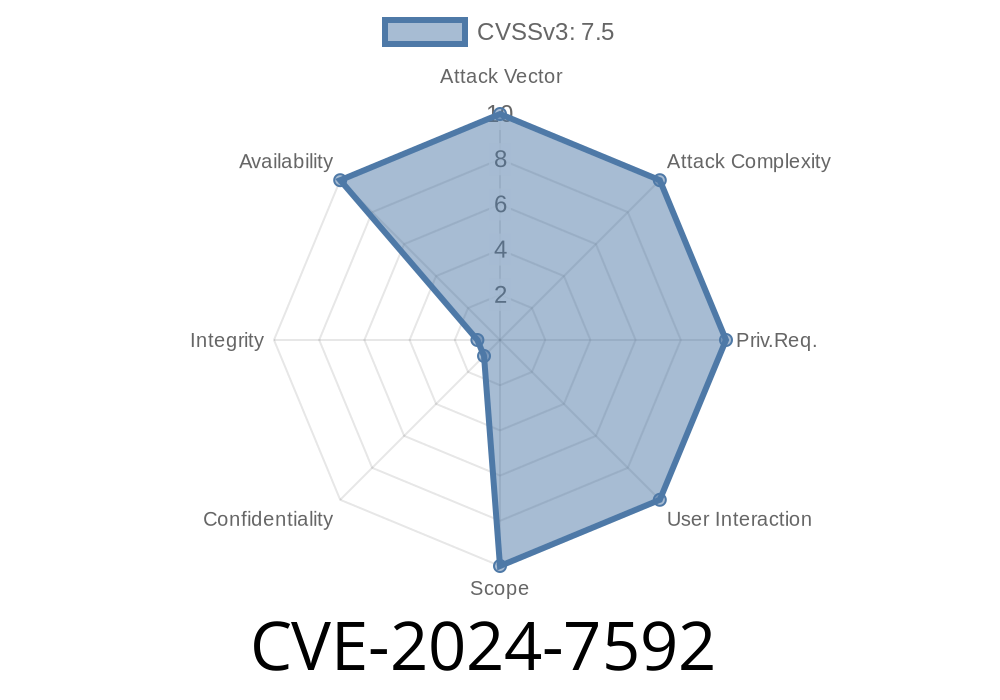If you work with Python web apps, you probably rely on the http.cookies module for handling user cookies. Recently, CPython (the standard Python implementation) disclosed a vulnerability (CVE-2024-7592) that might not let hackers steal data, but could let attackers waste your servers’ time and resources. Let's break down what the bug is, why it matters, and show you a real-world code scenario.
What Is CVE-2024-7592?
This vulnerability lives inside the http.cookies standard library module of CPython. Whenever a cookie string contains backslashes for quoting characters (which is technically allowed in RFC 6265), the parser tries to carefully un-escape every little bit. But it does so with an algorithm that is O(n²) quadratic complexity.
At first glance, this sounds academic. But attackers can send long, tricky cookie strings full of backslashes—making your Python server spend abnormal amounts of CPU time just “untangling” the cookie value. Given enough of these requests, your web app might slow down or even become unresponsive because the CPU is spent parsing junk, not serving your users.
A Simple Example: How Does This Look in Code?
Let’s reproduce the bad behavior with a simple code sample.
import http.cookies
import time
# Generate a long string full of escaped quotes (\"), which require extra parsing
evil_value = "\\" * 20000 + '"end'
# Create a "Set-Cookie" header
cookie_string = 'key="{}"'.format(evil_value)
start = time.time()
# CPython <=3.11.x will hang here for a noticeable time
cookie = http.cookies.SimpleCookie()
cookie.load(cookie_string)
print(f"Time taken to parse: {time.time() - start:.2f} seconds")
With enough backslashes, parsing the value becomes painfully slow as the algorithm tries to work out every escaped character. Attackers can leverage automated tools to flood your server with such requests.
Real-World Exploit Details
1. Attacker sends HTTP requests with Cookie or Set-Cookie headers filled with massive amounts of backslashes or escaped characters.
Target server uses http.cookies to parse that header.
3. CPU usage spikes for each request, causing slow-downs and even denial-of-service as resources are consumed.
Example HTTP Request (abbreviated)
GET / HTTP/1.1
Host: victim.com
Cookie: session="\\\\\\\\\\\\...\\\\\\"end"
If your Python-based server parses all cookies with the standard library, it will struggle to even read that header.
Who Is at Risk?
- All CPython deployments (including frameworks like Django, Flask, Bottle) for versions that haven’t patched this bug.
- Especially relevant if your app analyzes cookies on every request or if your public endpoints don’t limit header length.
How To Defend
- Upgrade Python: Once security releases are available, upgrade to the patched CPython version. Check Python’s security page
- Limit Header Size: Many webservers (e.g., nginx, Apache) let you limit the maximum size of headers. Configure this to block massive cookies.
- Middleware Validation: If you use custom middleware, discard or ignore cookies with suspiciously large or complex values.
Sample nginx config
server {
...
large_client_header_buffers 2 1k; # Reject huge headers
}
Original References
- Python Security Advisory (CVE-2024-7592)
- CPython Issue Tracker Discussion
- CVE Record at NVD
Summary
CVE-2024-7592 is not going to help hackers break into your site or steal secrets. But it’s a classic “annoyance vector” that can slow your server to a crawl with enough effort. Always patch your Python, and keep an eye on resource usage spikes—sometimes all an attacker needs is a cunning cookie string.
Timeline
Published on: 08/19/2024 19:15:08 UTC
Last modified on: 09/07/2024 02:45:03 UTC
